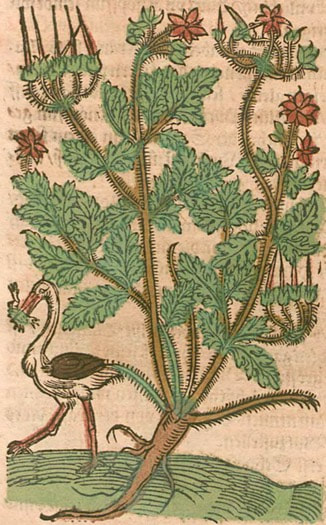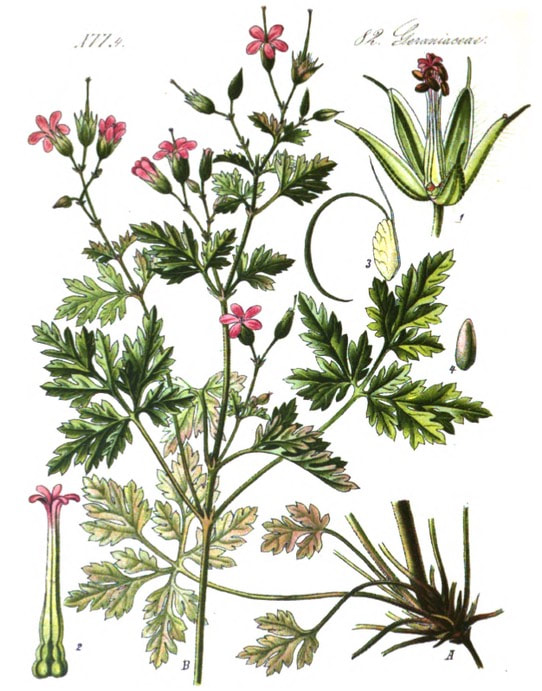Geranium, Herb Robert
Cranesbill is the common name of the Geraniums
Gratia Dei (used for a number of Geranium species)
Gratia Dei (used for a number of Geranium species)
Geranium robertum
Krauterbuch, Lonitzer, 1578
Krauterbuch, Lonitzer, 1578
Geranium robertum
Flora von Deutschland (21), Kohler, 1885
Flora von Deutschland (21), Kohler, 1885
Botanical name:
Geranium robertum (syn. G. robertianum)
Parts used:
Herb
Temperature & Taste:
Cool, dry. (Schroder said 'temperately Hot and dry, and Cold'). Bitter, Salty
Classification:
2D ATTENUATERS OF CONGEALED BLOOD
Geranium robertum (syn. G. robertianum)
Parts used:
Herb
Temperature & Taste:
Cool, dry. (Schroder said 'temperately Hot and dry, and Cold'). Bitter, Salty
Classification:
2D ATTENUATERS OF CONGEALED BLOOD
ADVERTISEMENT:
Uses:
1. Clears Heat and Toxin, Moves the Blood, Resolves Masses:
-dissolves Congealed Blood, and Stops Blood; used for Bruising and Trauma
-good to cleanse and heal Wounds
-in compounds for Scrofula, Tumors and Cancers
2. Clears Heat and Damp, Promotes Urine, Clears Stones:
-suppressed or burning Urine, Jaundice
-especially for Gravel and Stones (West, Ayurveda)
-related species used in Asian medicine clear Wind and damp and are used for Rheumatism, Arthralgia and Stroke.
3. Clears Wind-Heat:
-Fevers (internally, and with salt and vinegar applied to the soles and pulses).
-various skin conditions coming from heat.
4. Clears Heat, Stops Bleeding:
-commended to stop bleeding from the Nose, Mouth, Throat or Gastrointestinal Tract;
-especially Bleeding of Wounds.
5. Clears Heat, Settles Wind, Calms the Mind:
-Large doses (2 drams of the powder) were given to Lunatics. (Fioravanti)
6. Externally:
-applied to fresh Wounds, Tumors and Ulcers, including old Ulcers of the Genitals.
-concentrated decoction or ointment can be applied to chronic non-healing sores and cancers
-decocted in lye as a wash to chronic and putrid ulcers
-poultice for Rheumatism.
-the decoction made with lye is used as a wash for putrid Ulcers.
-all Cranesbills are used externally to allay the heat of Fever (applied to the Soles with Salt and Vinegar)
-also to ‘discuss’ Milk, and for ‘Clefts’ of the Breasts
Dose:
1–2 teaspoonfuls in infusion
Decoction: 5–15 grams
1–2 teaspoonfuls in infusion
Decoction: 5–15 grams
Main Combinations:
1. Scrofula:
i. Herb Robert with ... available in PRO version
ii. Gratia Dei (1 oz.), ... available in PRO version
2. Tumors and Cancer, Herb Robert with ... available in PRO version
3. Cancer:
i. Herb Robert with ... available in PRO version
ii. Herb Robert with ... available in PRO version
4. Trauma, Wounds, Herb Robert with ... available in PRO version
5. Inflammations, Ulcers and Tumors, ... available in PRO version
Major Formulas:
Decoction Against Scrofula (Fuller)
Decoction for Cancer (Fuller)
Universal Vulnerary Decoction (Joseph Du Chesne)
ADVERTISEMENT:
Cautions:
1. Not for Cold and weakness of the digestive system.
Main Preparations used:
Distilled Water of the Herb
1. Not for Cold and weakness of the digestive system.
Main Preparations used:
Distilled Water of the Herb




